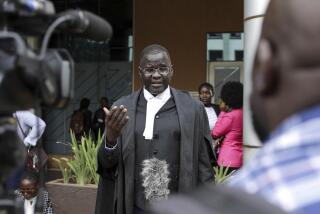Gays Chalk Up New Rights to Nation’s Cruel History
JOHANNESBURG, South Africa — As a youth, Simon Nkuli had two strikes against him under the white supremacist system of apartheid and the stern Calvinist morality that underpinned it: He was both black and homosexual.
Thus he endured five years in various jails and prisons for his political activism before being acquitted of treason charges in 1988. And he was both tortured and mocked by police, who called him a moffie, a pejorative for gays.
Once he was free, Nkuli made it a special mission to bring gay rights into the liberation struggle. He traveled abroad to argue his case before exiled leaders of the then-banned African National Congress. And he won strong support from Nelson Mandela shortly after the future president was released from prison in 1990.
“I was one of the first gay people to come out within the anti-apartheid movement,” recalled Nkuli, now 39 and head of a group for HIV-positive black men. “But the ANC leadership was quite supportive. They hated each and every form of discrimination.”
Nkuli and other gays and lesbians in South Africa saw their long campaign for sexual equality enshrined in law Tuesday when Mandela signed the country’s new constitution, one of the world’s most liberal charters.
The document, approved Dec. 4 by the nation’s highest court, prohibits discrimination on any basis, including race, age, gender, sexual orientation, physical disability, language or religion. No other nation’s constitution specifically protects gays and lesbians from discrimination by both the government and individuals.
“It’s very significant,” said Zackie Achmat, co-chairman of the National Coalition for Gay and Lesbian Equality, a Johannesburg-based umbrella group of 73 organizations. “There’s still a lot of work to do, but obviously we’re ahead of most other nations.”
Ironically, gay activists credit South Africa’s cruel history of official intolerance and oppression for their success at winning legal protection. Every major political party has lined up to support gay rights, fearful of being tagged as pro-discrimination. The result is that the issue is far less polarizing than in such countries as the United States.
“What’s unique in South Africa is [that] the vast majority of people suffered discrimination in the past, not just a minority,” said Kevan Botha, a lawyer who represents the coalition. “So the whole population feels a tremendous repugnance now toward any kind of discrimination. The goal in the constitution was to get rid of systemic discrimination of any kind.”
The impact of the new guarantees is already growing. A recent labor relations act specifically protects gays and lesbians from bias in the workplace, for example. And the military earlier this year barred discrimination against gays in recruitment, training and promotions.
Other signs are also significant. In September, police, who once took the lead in gay-bashing, showed up for the first time to join--rather than disrupt--several thousand people who marched through downtown Johannesburg for the country’s sixth annual Gay Pride parade. For the first time too, the City Council helped finance the march.
Ministers at a dozen or so churches in major cities officiate at same-sex marriages, although the unions are still not recognized by law. For all that, Phumzile Mtetwa, co-chair of the Gay and Lesbian Organization of Witwatersrand, or GLOW, warns that the new law has not changed homophobic attitudes, especially in some black communities where homosexuality remains culturally taboo.
“We still have many people who believe homosexuality is non-African, that it’s a Western influence,” said Mtetwa, who is black. “If they say that, they don’t understand their own culture and their own history.”
More to Read
Sign up for Essential California
The most important California stories and recommendations in your inbox every morning.
You may occasionally receive promotional content from the Los Angeles Times.











